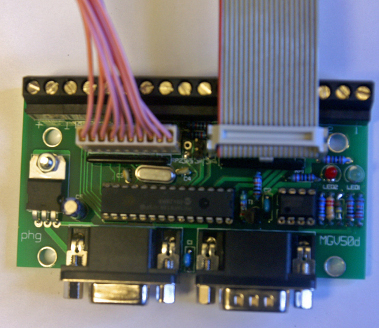Table of Contents
GCA129 Led-indicator interface
Description
In some large displays, it might be nice to indicate a route, where a train is sensed.
But the larger the track on display is, the more leds you will need to have a nice indication.
These leds of course can be connected all parallel together, all with separate resistors, but the GCA50 or CAN-GC2 is not able to supply that.
With this interface it is possible.
Depending on the separate connected power supply, (more about that later) it can switch on and off a serial chain of multiple Leds.
The current throught these leds is limited (with the listed resistors) to approx 18 mA.
For example: with 24 V dc power suplly it will be possible to make a chain of 7 green/white/blue leds or 10 red/yellow leds.
The power supply must be a dedicated one for this interface only, but the power could also be taken from the LocoNet power line.
Simply connect point 1 of DB9 connector of GCA50 or CAN-GC2 to J4(pt2).
The + (plus) of the led-chains are connected to J4(pt3). The - (minus) of the 16 led-chains are connected to J1.(pt1..16)
The board needs all 16 outputs from GCA50/CAN-GC2.
GCA50 is connected via J2 and J3.
Important notes :
* It is strongly discouraged to exceed 24 Volt supply, to protect anyone from possible physical harm.
* We refuse any responsability of not complying to this remark!
* Also precaution has to be taken that power supply is adiquate fused, to prevent fire hazard in case of fault connections.
* Since each chain has a transistor which regulates the current, this transistor can become seriuosly warm.
To be on the safe side, the total power of each transistor should not exceed 1/4W.
This power is calculated by this formula :
P = (V-1.2-(Vl x Leds)) x 0.018
where P = total dissipated power in transistor in Watts.
V = the power supply in Volt
V1 = depending on type of leds > each colour has different voltage see table below
Leds = total amount of leds in the given line.
Example:
V=24V
V1= 2.2 (red led)
Leds = 4
P= (24-1.2-(2.2 x 4)) x 0.018 = 0,245W THIS JUST FITS!
Table of Voltages for Leds This figures are general info and can slightly be different.
| led colour | Volt |
|---|---|
| white | 3.1 |
| warm-white | 3.2 |
| blue | 3.2 |
| green | 3.2 |
| yellow | 2.2 |
| orange | 2.2 |
| red | 2.2 |
| purple | 3.7 |
There is a nice info site about leds, originated in Dutch, but also in English available:
The hardware
* The pcb-layout also contains the parts displacement
The protoype
Bill of materials
| Qty | Ind | Description |
|---|---|---|
| 16 | R1..R16 | 4K7 |
| 16 | R17..R32 | 33E |
| 32 | D1..D32 | Diode 1N4148 |
| 16 | T1..T16 | BC547b |
| 1 | J1 | Header 2x8 pins |
| 2 | J2..J3 | PS254/10G |
| 1 | J4 | AKL012/3 |
Connection cable GCA50 <> Interface
Two possible options can be used for this connection. (see picture below)
Option 1 (left on picture)
This cable should be made with wire 0,25mm.
| Qty | Materials | supplier |
|---|---|---|
| 2 | PSK254/10W | www.reichelt.de |
| 1 | PSK-Kontakte (set of 20 pcs) | www.reichelt.de |
| 1 | Psk-Crimpzange | www.reichelt.de |
Option 2 (right on picture)
Flatcable 10x2 + connectors. The side without the notch will fit easily.
| Qty | Materials | supplier |
|---|---|---|
| 2 | PFL 20 | www.reichelt.de |
| 1 | Flatcable AWG 28-20G 3M | www.reichelt.de |
| 1 | Crimpzange MWZ 214 | www.reichelt.de |


